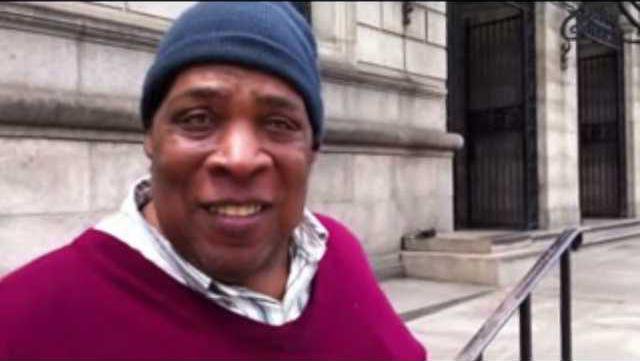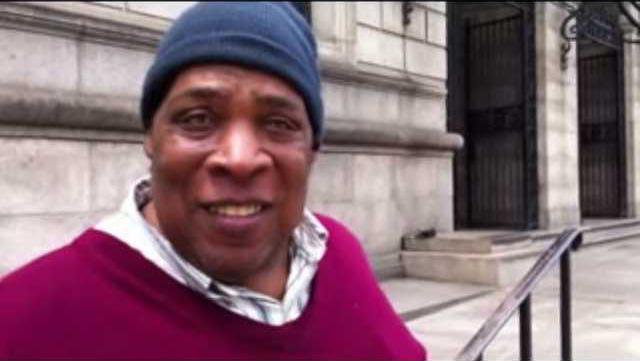Alfred Postell is a Harvard-educated lawyer. Hes also chronically homeless.
The Washington Post ran a story about Postell, chronicling his life from childhood through law school, when he was a classmate of Chief Justice John Roberts, and up to life on the streets of Washington, D.C.
Postells story is remarkable his identity, hidden behind a "tangled beard" was uncovered by a judge who happened to be another Harvard classmate but its not uncommon. Educated people across the country are not immune to the challenges of cutthroat job and expensive housing markets, compounded in many cases by mental health conditions.
In 2011, a video of a man named Maurice Johnson discussing his life went viral. Johnson received his master's degree in plasma physics from Dartmouth College, according to his testimonial, but was struggling to find work.
"It's just simply bad luck," he said. "When you have no money, it's very difficult to start over."
Even college students, burdened by thousands (if not hundreds of thousands) of dollars of debt, are struggling to stay afloat. In 2013, over 56,000 students were homeless, according to federal financial aid records collected by the National Association of Student Financial Aid Administrators.
"I don't have any trust fund anywhere. I don't have any backup money," Manny, 21 and homeless, told the Chicago Tribune. "I don't have anything from any outside sources. It literally is just me. So, if I don't get my crap together, I am just going to be out there."
Postell described his decline from lawyer to homeless to the Post.
You get into a firm, its prestigious, he said. And when you lose that position, its like suicide. Its all over. Its atrophy. Or as accountants say, its to be obsolete. You know what that means? Obsolescence. Beyond your useful life. I was beyond my useful life.
Postells misfortune was coupled with a life-altering diagnosis. He was schizophrenic.
In January of last year, 578,424 people were homeless, according to the U.S. Department of Housing and Urban Development. Of those, 124,000, or one-fifth, were suffering from a mental illness. The Treatment Advocacy Center found in a later study that the ratio might be closer to one in three.
Between 2009 and 2011, states cut $4 billion from mental health services, according to Mental Health America. In the worst example, Kentucky cut its mental health budget in half.
For young adults and adults living with mental illness, the consequences of going untreated include "frequent visits to emergency rooms, hospitalizations, homelessness, entanglement with juvenile and criminal justice systems, the loss of critical developmental years, premature deaths and suicides," the National Alliance on Mental Health reported.
The Washington Post ran a story about Postell, chronicling his life from childhood through law school, when he was a classmate of Chief Justice John Roberts, and up to life on the streets of Washington, D.C.
Postells story is remarkable his identity, hidden behind a "tangled beard" was uncovered by a judge who happened to be another Harvard classmate but its not uncommon. Educated people across the country are not immune to the challenges of cutthroat job and expensive housing markets, compounded in many cases by mental health conditions.
In 2011, a video of a man named Maurice Johnson discussing his life went viral. Johnson received his master's degree in plasma physics from Dartmouth College, according to his testimonial, but was struggling to find work.
"It's just simply bad luck," he said. "When you have no money, it's very difficult to start over."
Even college students, burdened by thousands (if not hundreds of thousands) of dollars of debt, are struggling to stay afloat. In 2013, over 56,000 students were homeless, according to federal financial aid records collected by the National Association of Student Financial Aid Administrators.
"I don't have any trust fund anywhere. I don't have any backup money," Manny, 21 and homeless, told the Chicago Tribune. "I don't have anything from any outside sources. It literally is just me. So, if I don't get my crap together, I am just going to be out there."
Postell described his decline from lawyer to homeless to the Post.
You get into a firm, its prestigious, he said. And when you lose that position, its like suicide. Its all over. Its atrophy. Or as accountants say, its to be obsolete. You know what that means? Obsolescence. Beyond your useful life. I was beyond my useful life.
Postells misfortune was coupled with a life-altering diagnosis. He was schizophrenic.
In January of last year, 578,424 people were homeless, according to the U.S. Department of Housing and Urban Development. Of those, 124,000, or one-fifth, were suffering from a mental illness. The Treatment Advocacy Center found in a later study that the ratio might be closer to one in three.
Between 2009 and 2011, states cut $4 billion from mental health services, according to Mental Health America. In the worst example, Kentucky cut its mental health budget in half.
For young adults and adults living with mental illness, the consequences of going untreated include "frequent visits to emergency rooms, hospitalizations, homelessness, entanglement with juvenile and criminal justice systems, the loss of critical developmental years, premature deaths and suicides," the National Alliance on Mental Health reported.



